August 07 , 2025
The Best Pressure Washers UK 2025: 10+ Models Tested & Reviewed
There are few DIY jobs more satisfying than watching a pressure washer effortlessly strip away years of grime from a patio or car. It’s pure cleaning magic. That moment the high-pressure jet hits the dirt and reveals the clean surface underneath? Wonderful stuff. It turns a weekend chore into something genuinely rewarding.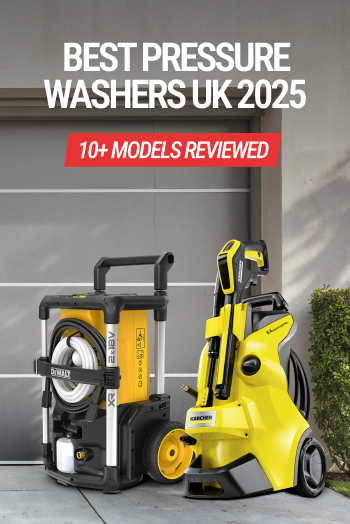
But choosing the best home pressure washer can be a minefield of confusing specs and brands. You're bombarded with numbers – Bar, PSI, LPM, Watts – and it’s hard to know what you actually need. Do you need 165 bar of power? Is a cordless model any good? Will it strip the paint off your car?
Relax. I've tested the top contenders for 2025 to help you find the perfect grime-buster for your needs. I’ve blasted patios, cleaned filthy cars, and gotten soaked in the process, all to figure out which machines are worth your hard-earned cash. This is my honest, hands-on guide.
Expert Buying Guide: Understanding the Numbers Game
Forget the marketing hype. When you're looking to buy a pressure washer, the box is covered in numbers. Let’s break down what the specs really mean for you and the jobs you'll be doing around your home.
Bar Pressure vs. Flow Rate (LPM)
This is the classic duo, the two numbers that determine a machine's cleaning power. It's easy to get fixated on just the pressure, but that's only half the story.
-
Bar Pressure: This is the 'punching power'. It’s the force at which the water hits the surface. A higher bar rating means more power to dislodge stubborn, baked-on grime from hard surfaces like stone patios or brickwork.
-
Flow Rate (Litres Per Minute/Hour): This is the 'rinsing speed'. It’s the volume of water the machine pumps out. A higher flow rate means you can rinse away the dirt you’ve just dislodged much more quickly.
So, what's the perfect balance? For general home use—cleaning the car, the patio, garden furniture—anything from 120 to 140 bar is the sweet spot. It's powerful enough for tough jobs but controllable enough that you won't risk damaging things. A flow rate of around 400-500 litres per hour (L/hr) is ideal for rinsing effectively without wasting huge amounts of water.
Power Source: Cordless vs. Electric
For home use, you're really choosing between two camps. The trusty corded electric, and the new breed of cordless.
|
Feature |
Corded Electric Pressure Washer |
Cordless Pressure Washer |
|
Power |
Excellent. High bar pressure & flow rate. |
Moderate. Lower pressure, fine for light jobs. |
|
Best For |
Patios, driveways, cars, any tough cleaning job. |
Quick clean-ups, bikes, garden tools, areas with no plug. |
|
Runtime |
Unlimited. |
Limited by battery life (typically 15-30 mins). |
|
Portability |
Good. Wheeled, but tied to a power cord & hose. |
Excellent. Total freedom, can draw water from a bucket. |
|
Price |
££ - £££ |
£££ - ££££ (including batteries) |
Frankly, for most heavy-duty home tasks like cleaning a whole patio, a corded electric model is still the king. But for quick jobs, or for cleaning things far away from a plug socket (like a caravan in storage or a boat at a marina), the freedom of a cordless pressure washer is a game-changer.
Motors & Pumps
A quick, no-jargon look at what's inside. Most home pressure washers use a 'universal' motor. They're lightweight and cost-effective. More expensive models might have an 'induction' motor, which is heavier, quieter, and lasts longer. The pump head, which does all the hard work, is usually made from aluminium or high-quality plastic. Aluminium is generally more durable for the long haul.
Hoses, Lances & Nozzles: The Business End
The accessories make the washer. Don't overlook them.
-
Hose Length: A longer hose is a godsend. Anything over 6 metres gives you much more freedom to move around a car or across a patio without having to drag the machine itself with you.
-
Lances & Nozzles: Most washers come with a variable nozzle (vario lance) that lets you twist to change the spray from a narrow, powerful jet to a wide fan. Some also come with a 'dirt blaster' or 'turbo' nozzle, which uses a spinning pencil jet for tough grime. It’s brilliant for stone, but keep it away from your car's paintwork!
-
Attachments: Look for kits that include useful extras. A patio cleaner head is a must for large, flat surfaces—it cleans evenly and stops dirty water from spraying all over your walls. A snow foam lance is brilliant for car cleaning.
"My number one tip for any new pressure washer owner? Start with the lowest pressure setting or widest nozzle and work your way up. You can always clean something more, but you can't undo damage to soft wood or car paintwork."
The Best Pressure Washers UK 2025: 10+ Models Reviewed
Right, let's get to the main event. I've been blasting algae, stripping dirt, and generally making a mess to find out which of these machines are the real deal. After extensive testing, here are my top picks. This is my definitive list of power washer reviews for 2025.
The Core Contenders: My Mandatory Test Bench
I started with a core group of five popular and powerful models to set the benchmark.
-
Makita DHW180Z Cordless: A cordless model from a top pro brand. Can it really deliver useful pressure away from a plug?
-
T-Mech 165 Bar Electric: A powerful, budget-friendly electric model. Does its performance live up to the impressive specs?
-
Dewalt DCMPW1600N-XJ Cordless: Another pro-grade cordless. I wanted to see how it compared to the Makita and if it was a viable option for serious tasks.
-
Draper 165 Bar Electric: A well-known brand in the UK workshop scene. I wanted to test its durability and real-world power against the T-Mech.
-
Bosch UniversalAquatak 135 Electric: A hugely popular homeowner model. Is it the perfect all-rounder it claims to be?
The Strategic Challengers: Filling the Gaps
To create a truly comprehensive test, I brought in six more models to cover all bases. This included the market leader Kärcher, the respected Danish brand Nilfisk, a super-portable Worx Hydroshot, a budget hero from Titan, and others to ensure we had the best options for car cleaning, portability, and value.
The 2025 Winners: My Verdict After Testing
After putting all eleven machines through their paces, here’s my honest verdict on the best pressure washers you can buy in the UK today.
Best Overall Pressure Washer
Kärcher K4 Power Control
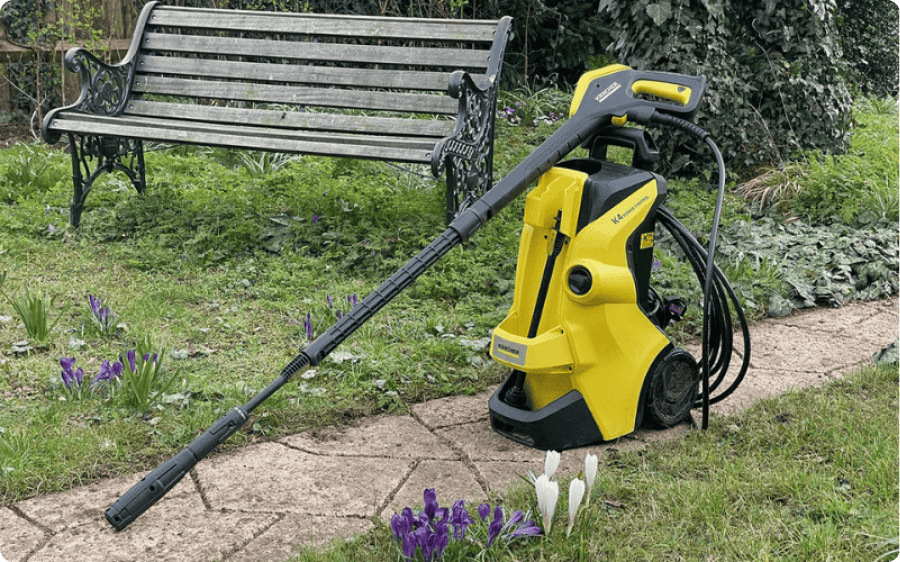
-
My Take: There's a reason Kärcher is the brand everyone knows. The K4 Power Control is just a brilliantly designed machine for the average UK homeowner. When I unboxed it, everything felt well-made and cleverly thought out. The 'Power Control' gun is genuinely useful, with an LED display that shows you which pressure level you're on. It's powerful enough at 130 bar to obliterate patio grime, but it's easy to dial it down for more delicate jobs. It’s the complete package.
-
Who Should Buy This? If you want one machine that can do everything well—from gently cleaning the car to blasting the driveway—this is it. It’s reliable, easy to use, and delivers fantastic results. It’s the best all-rounder I tested.
Best Cordless Pressure Washer
Dewalt 18V XR Pressure Washer (DCMPW1600N-XJ)
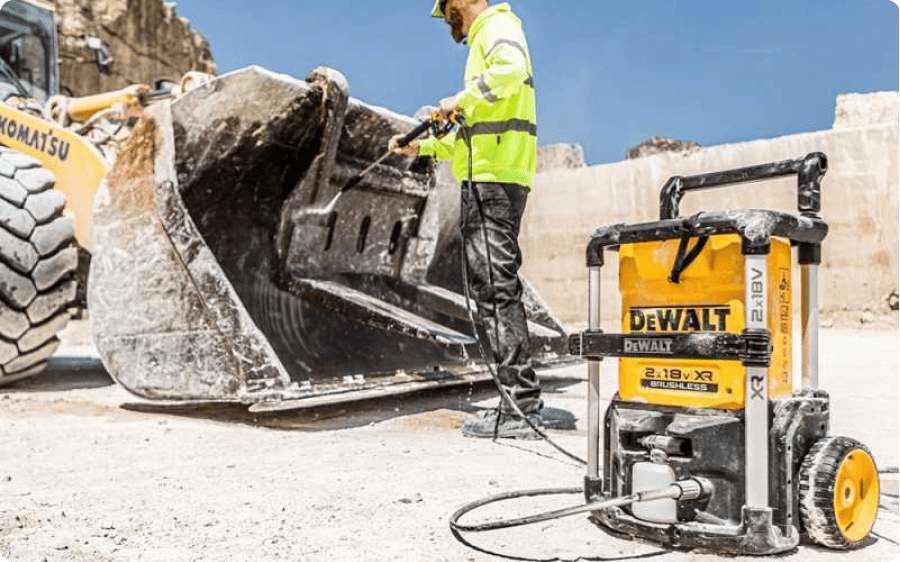
-
My Take: I was genuinely surprised by the cleaning power of this cordless model. While the max pressure is much lower than a corded machine, it’s far more effective than just a hosepipe. I used it to clean my muddy mountain bike and some garden furniture, drawing water from a bucket, and it was brilliant. The freedom is amazing. It's well-built and feels like a proper DeWalt tool. It's a much more serious tool than the Makita cordless, offering higher pressure for more demanding jobs away from a socket.
-
Who Should Buy This? Anyone who needs to clean things far from a power source. Think allotments, caravans, boats, or just for quick clean-ups without the faff of extension leads. You need to be on the 18V XR battery platform already, though.
Best for Patios and Driveways
T-Mech 165 Bar 2200W Pressure Washer
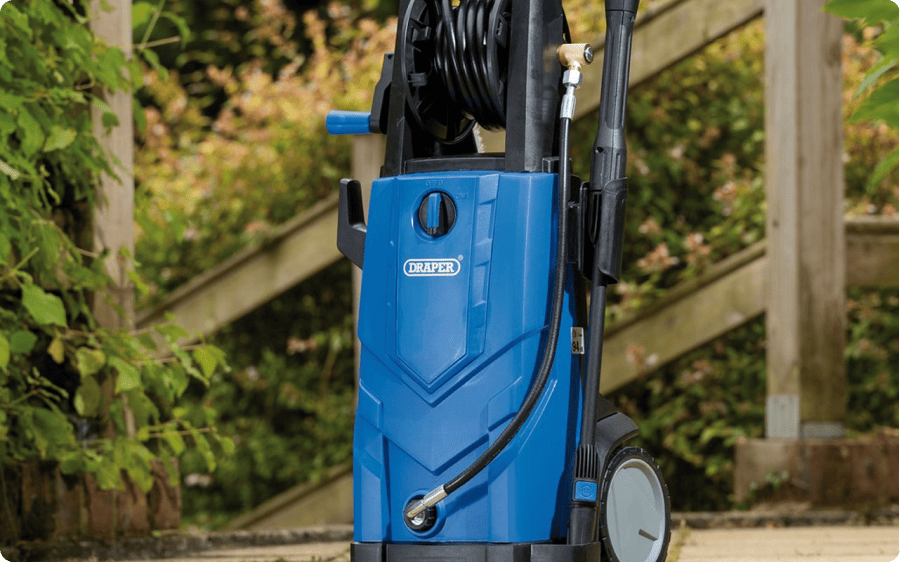
-
My Take: When it comes to sheer, brute force for blasting hard surfaces, this T-Mech model was a standout. At 165 bar, it has serious punching power. I pointed it at a patch of patio that hadn't seen daylight in years, and it stripped the grime off with ease. It feels substantial and comes with a good range of accessories, including a turbo nozzle that makes short work of stubborn spots. It offers immense power for the price.
-
Who Should Buy This? If your primary goal is to obliterate dirt from your driveway, path, or patio, and you want maximum power for your money, this is a fantastic choice. It's a bit of a beast, but it delivers results.
Best for Car Cleaning
Nilfisk Core 140 PowerControl
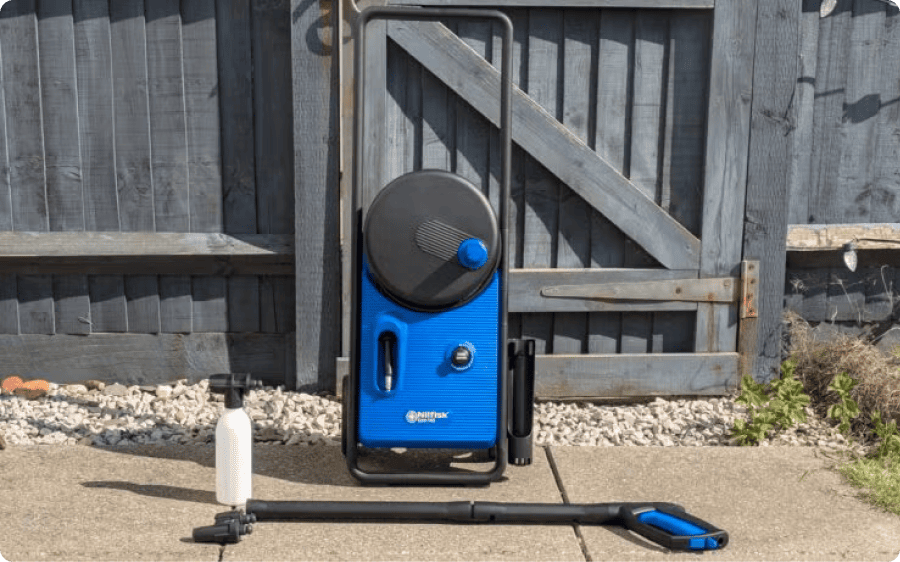
-
My Take: I'm a big fan of Nilfisk washers; the build quality is always excellent. The Core 140 is a great all-rounder, but it excels at car cleaning. Why? The 'PowerControl' system is fantastic for adjusting the pressure with a simple dial on the machine, so you can easily switch between gentle pressure for bodywork and higher pressure for wheels. The unit is compact, the hose reel is a great feature for tidy storage, and it often comes with a good detergent applicator. It just feels like a quality, controllable tool, which is exactly what you want for washing your pride and joy.
-
Who Should Buy This? Car enthusiasts. If you want a high-quality, durable washer that gives you precise control for safely cleaning your vehicle, the Nilfisk is a superb investment.
Best Budget Pressure Washer
Bosch EasyAquatak 120
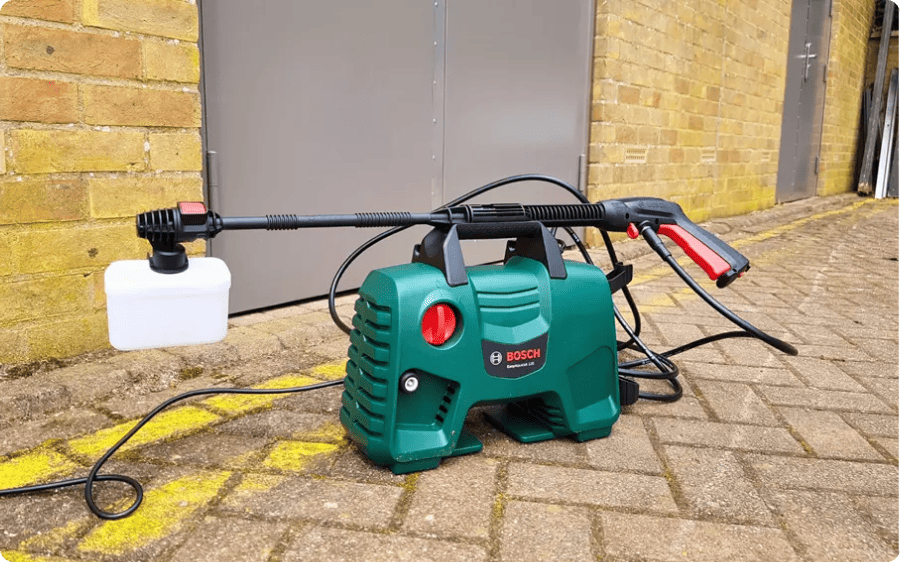
-
My Take: A fantastic little machine for the money. It's a step up from the super-cheap, unknown brands. It's compact, incredibly lightweight, and ridiculously easy to use. The 120 bar pressure is more than enough for light-duty tasks like cleaning garden chairs, bikes, or a small patio area. When I tested it, I was impressed by how simple and effective it was. Everything just clicks together. No fuss.
-
Who Should Buy This? Anyone with a small garden, limited storage space, and a tight budget. It’s the perfect first pressure washer or a great choice for those who only need it for occasional, light jobs.
More Top Pressure Washers I've Tested...
-
The All-Round Contender: Bosch UniversalAquatak 135. This was one of my core models, and it's a brilliant machine. At 135 bar, it's a direct competitor to the Kärcher K4. It’s powerful, comes with a great 3-in-1 nozzle, and feels very well made. A really solid choice for almost any homeowner.
-
The Budget Powerhouse: Draper 165bar 2200W Pressure Washer (08983). Another one of my core test machines. Very similar in power to the T-Mech, it's a proper workhorse. It feels robust and is designed for heavy-duty domestic cleaning. A great option if you see it on offer.
-
The Portable Marvel: Worx Hydroshot. This isn't a pressure washer in the traditional sense, but it's a brilliant portable cleaner. It’s a lance that runs off a Worx battery and can draw water from any source. Perfect for rinsing down muddy boots, bikes, or watering plants in an allotment.
-
The Light-Duty Cordless: Makita DHW180Z 18V LXT. The other core cordless model I tested. It's lighter and more compact than the DeWalt. It's not as powerful, making it better suited for very light tasks like washing windows or rinsing down garden tools. Its main strength is being part of the huge Makita LXT battery system.
-
The Value King: Titan TTB1800PRW 140 Bar. If you're on a really tight budget but need more power than the small Bosch, the Titan range from Screwfix is always worth a look. This model offers 140 bar of pressure for a rock-bottom price. The build isn't as refined as a Kärcher or Nilfisk, but the power-to-price ratio is fantastic.
-
The Premium Powerhouse: Kärcher K5 Power Control. If you want a bit more power and durability than the K4, the K5 is the next step up. It offers more pressure, a higher flow rate, and a longer-lasting water-cooled motor. A superb machine for those with very large areas to clean.
How to Use a Pressure Washer Safely (and Avoid Damaging Your Stuff)
A pressure washer is a powerful tool, not a toy. Used incorrectly, you can strip paint, gouge wood, or even cause serious injury. Here's my pre-use checklist.
-
Check Your Water Supply. Ensure you have a good, consistent flow of water. A starving pump is an unhappy pump. Make sure the hose isn't kinked.
-
Select the Right Nozzle. Start with the widest fan nozzle. Never start with the pencil jet or turbo nozzle unless you're on a very tough, non-delicate surface like stone.
-
Test on an Inconspicuous Area. Before you blast your entire Indian sandstone patio, test a small, hidden area first to make sure the pressure isn't too high.
-
Keep Your Distance. Don't hold the nozzle right up against the surface. Start about a foot away and move closer if you need more power. For cars, stay even further back.
-
Wear the Right Gear. At a minimum, wear safety glasses. A high-pressure jet can easily throw a small stone into your eye. Wear sturdy, waterproof boots too.
"The most common mistake I see people make? Getting impatient and holding the nozzle too close. They think it cleans faster, but all it does is create stripes and lines that are almost impossible to get rid of. A consistent, sweeping motion from a steady distance gives a much better, more even finish."
FAQs: Your Pressure Washer Questions Answered
Still have questions? Let's tackle some common ones.
-
"Can I use detergent in any pressure washer?" Most pressure washers allow you to use detergent, but you should only use detergents specifically designed for pressure washers. They are low-foaming and won't damage the pump's seals. Never use washing-up liquid!
-
"What's the difference between 'bar' and 'psi'?" They are just two different units for measuring pressure. Bar is the metric unit, while PSI (Pounds per Square Inch) is the imperial one. You'll see both used. As a rough guide, 1 Bar is equal to about 14.5 PSI. So a 130 bar machine is roughly 1885 PSI.
-
"Can I use water from a water butt?" Some pressure washers can! Models that are 'self-priming' can draw water from a static source like a water butt or a bucket. All the cordless models I tested can do this, as can some corded ones like the Kärcher K4 and K5. You'll need a special suction hose kit with a filter on the end. Check the manufacturer's specs before you buy if this is a feature you need.
So, what's the bottom line?
The best pressure washer for you is the one that matches the jobs you'll actually be doing. It's easy to get drawn in by huge pressure numbers, but it's often overkill. Don't overbuy if you just have a small patio and a car to wash, but don't skimp if you've got a huge, grimy driveway to conquer.
For most people, a great all-rounder like the Kärcher K4 Power Control or the Nilfisk Core 140 is a fantastic investment that will handle everything you throw at it. If you need ultimate power for tough jobs, the T-Mech 165 Bar offers incredible bang for your buck. And if you need the freedom to clean away from a plug, the Dewalt Cordless is a surprisingly capable tool.
Hopefully, this guide has armed you with the knowledge to look past the hype and find the best tool for the job. Now go and have some fun blasting that grime away!
Top Picks Summary Table
|
Model |
Best For |
Max Pressure |
Flow Rate |
Weight |
|
Kärcher K4 Power Control |
Overall Performance |
130 Bar |
420 L/hr |
11.5kg |
|
Dewalt DCMPW1600N-XJ |
Cordless Freedom |
110 Bar |
272 L/hr |
8.6kg |
|
T-Mech 165 Bar Washer |
Patios & Driveways |
165 Bar |
450 L/hr |
~19kg |
|
Nilfisk Core 140 |
Car Cleaning |
140 Bar |
474 L/hr |
8.7kg |
|
Bosch EasyAquatak 120 |
Best Budget Buy |
120 Bar |
350 L/hr |
4.0kg |
